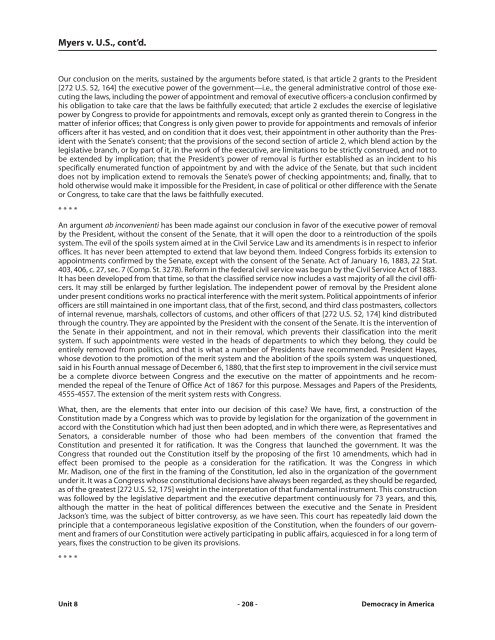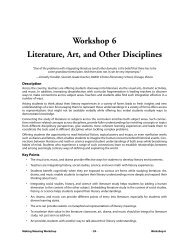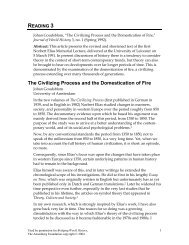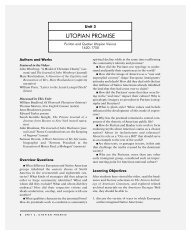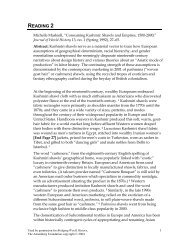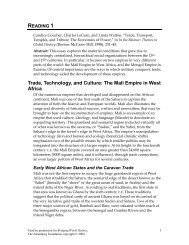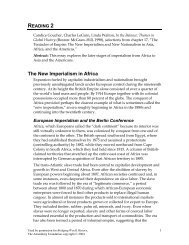Download Unit 8 Readings, Bureaucracy: A Controversial Necessity
Download Unit 8 Readings, Bureaucracy: A Controversial Necessity
Download Unit 8 Readings, Bureaucracy: A Controversial Necessity
Create successful ePaper yourself
Turn your PDF publications into a flip-book with our unique Google optimized e-Paper software.
Myers v. U.S., cont’d.<br />
Our conclusion on the merits, sustained by the arguments before stated, is that article 2 grants to the President<br />
[272 U.S. 52, 164] the executive power of the government—i.e., the general administrative control of those executing<br />
the laws, including the power of appointment and removal of executive officers-a conclusion confirmed by<br />
his obligation to take care that the laws be faithfully executed; that article 2 excludes the exercise of legislative<br />
power by Congress to provide for appointments and removals, except only as granted therein to Congress in the<br />
matter of inferior offices; that Congress is only given power to provide for appointments and removals of inferior<br />
officers after it has vested, and on condition that it does vest, their appointment in other authority than the President<br />
with the Senate’s consent; that the provisions of the second section of article 2, which blend action by the<br />
legislative branch, or by part of it, in the work of the executive, are limitations to be strictly construed, and not to<br />
be extended by implication; that the President’s power of removal is further established as an incident to his<br />
specifically enumerated function of appointment by and with the advice of the Senate, but that such incident<br />
does not by implication extend to removals the Senate’s power of checking appointments; and, finally, that to<br />
hold otherwise would make it impossible for the President, in case of political or other difference with the Senate<br />
or Congress, to take care that the laws be faithfully executed.<br />
* * * *<br />
An argument ab inconvenienti has been made against our conclusion in favor of the executive power of removal<br />
by the President, without the consent of the Senate, that it will open the door to a reintroduction of the spoils<br />
system. The evil of the spoils system aimed at in the Civil Service Law and its amendments is in respect to inferior<br />
offices. It has never been attempted to extend that law beyond them. Indeed Congress forbids its extension to<br />
appointments confirmed by the Senate, except with the consent of the Senate. Act of January 16, 1883, 22 Stat.<br />
403, 406, c. 27, sec. 7 (Comp. St. 3278). Reform in the federal civil service was begun by the Civil Service Act of 1883.<br />
It has been developed from that time, so that the classified service now includes a vast majority of all the civil officers.<br />
It may still be enlarged by further legislation. The independent power of removal by the President alone<br />
under present conditions works no practical interference with the merit system. Political appointments of inferior<br />
officers are still maintained in one important class, that of the first, second, and third class postmasters, collectors<br />
of internal revenue, marshals, collectors of customs, and other officers of that [272 U.S. 52, 174] kind distributed<br />
through the country. They are appointed by the President with the consent of the Senate. It is the intervention of<br />
the Senate in their appointment, and not in their removal, which prevents their classification into the merit<br />
system. If such appointments were vested in the heads of departments to which they belong, they could be<br />
entirely removed from politics, and that is what a number of Presidents have recommended. President Hayes,<br />
whose devotion to the promotion of the merit system and the abolition of the spoils system was unquestioned,<br />
said in his Fourth annual message of December 6, 1880, that the first step to improvement in the civil service must<br />
be a complete divorce between Congress and the executive on the matter of appointments and he recommended<br />
the repeal of the Tenure of Office Act of 1867 for this purpose. Messages and Papers of the Presidents,<br />
4555-4557. The extension of the merit system rests with Congress.<br />
What, then, are the elements that enter into our decision of this case? We have, first, a construction of the<br />
Constitution made by a Congress which was to provide by legislation for the organization of the government in<br />
accord with the Constitution which had just then been adopted, and in which there were, as Representatives and<br />
Senators, a considerable number of those who had been members of the convention that framed the<br />
Constitution and presented it for ratification. It was the Congress that launched the government. It was the<br />
Congress that rounded out the Constitution itself by the proposing of the first 10 amendments, which had in<br />
effect been promised to the people as a consideration for the ratification. It was the Congress in which<br />
Mr. Madison, one of the first in the framing of the Constitution, led also in the organization of the government<br />
under it. It was a Congress whose constitutional decisions have always been regarded, as they should be regarded,<br />
as of the greatest [272 U.S. 52, 175] weight in the interpretation of that fundamental instrument. This construction<br />
was followed by the legislative department and the executive department continuously for 73 years, and this,<br />
although the matter in the heat of political differences between the executive and the Senate in President<br />
Jackson’s time, was the subject of bitter controversy, as we have seen. This court has repeatedly laid down the<br />
principle that a contemporaneous legislative exposition of the Constitution, when the founders of our government<br />
and framers of our Constitution were actively participating in public affairs, acquiesced in for a long term of<br />
years, fixes the construction to be given its provisions.<br />
* * * *<br />
<strong>Unit</strong> 8 - 208 - Democracy in America


